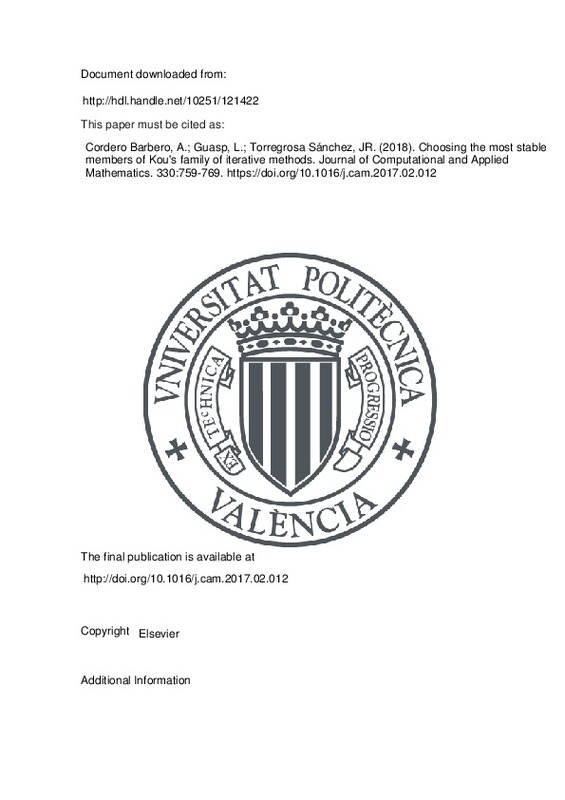JavaScript is disabled for your browser. Some features of this site may not work without it.
Buscar en RiuNet
Listar
Mi cuenta
Estadísticas
Ayuda RiuNet
Admin. UPV
Choosing the most stable members of Kou's family of iterative methods
Mostrar el registro sencillo del ítem
Ficheros en el ítem
| dc.contributor.author | Cordero Barbero, Alicia
|
es_ES |
| dc.contributor.author | Guasp, Lucia
|
es_ES |
| dc.contributor.author | Torregrosa Sánchez, Juan Ramón
|
es_ES |
| dc.date.accessioned | 2019-06-01T20:02:00Z | |
| dc.date.available | 2019-06-01T20:02:00Z | |
| dc.date.issued | 2018 | es_ES |
| dc.identifier.issn | 0377-0427 | es_ES |
| dc.identifier.uri | http://hdl.handle.net/10251/121422 | |
| dc.description.abstract | [EN] In this manuscript, we analyze the dynamical anomalies of a parametric family of iterative schemes designed by Kou et al. It is known that its order of convergence is three for any arbitrary value of the parameter, but it has order four (and it is optimal in the sense of Kung-Traub's conjecture) when a specific value is selected. Among all the elements of this family, one can choose this fourth-order element or any of the infinite members of third order of convergence, if only the speed of convergence is considered. However, the stability of the methods plays an important role in their reliability when they are applied on different problems. This is the reason why we analyze in this paper the dynamical behavior on quadratic polynomials of the mentioned family. The study of fixed points and their stability, joint with the critical points and their associated parameter planes, show the richness of the class and allow us to find members of it with excellent numerical properties, as well as other ones with very unstable behavior. Some test functions are analyzed for confirming the theoretical results. (C) 2017 Elsevier B.V. All rights reserved. | es_ES |
| dc.description.sponsorship | This research was supported by Ministerio de Economia y Competitividad MTM2014-52016-C2-2-P and Generalitat Valenciana PROMETEO/2016/089. | es_ES |
| dc.language | Inglés | es_ES |
| dc.publisher | Elsevier | es_ES |
| dc.relation.ispartof | Journal of Computational and Applied Mathematics | es_ES |
| dc.rights | Reconocimiento - No comercial - Sin obra derivada (by-nc-nd) | es_ES |
| dc.subject | Nonlinear equation | es_ES |
| dc.subject | Iterative method | es_ES |
| dc.subject | Dynamical behavior | es_ES |
| dc.subject | Fatou and Julia sets | es_ES |
| dc.subject | Basin of attraction | es_ES |
| dc.subject | Periodic orbits | es_ES |
| dc.subject.classification | MATEMATICA APLICADA | es_ES |
| dc.title | Choosing the most stable members of Kou's family of iterative methods | es_ES |
| dc.type | Artículo | es_ES |
| dc.identifier.doi | 10.1016/j.cam.2017.02.012 | es_ES |
| dc.relation.projectID | info:eu-repo/grantAgreement/GVA//PROMETEO%2F2016%2F089/ES/Resolución de ecuaciones y sistemas no lineales mediante técnicas iterativas: análisis dinámico y aplicaciones/ | es_ES |
| dc.relation.projectID | info:eu-repo/grantAgreement/MINECO//MTM2014-52016-C2-2-P/ES/DISEÑO DE METODOS ITERATIVOS EFICIENTES PARA RESOLVER PROBLEMAS NO LINEALES: CONVERGENCIA, COMPORTAMIENTO DINAMICO Y APLICACIONES. ECUACIONES MATRICIALES./ | es_ES |
| dc.rights.accessRights | Abierto | es_ES |
| dc.contributor.affiliation | Universitat Politècnica de València. Departamento de Matemática Aplicada - Departament de Matemàtica Aplicada | es_ES |
| dc.description.bibliographicCitation | Cordero Barbero, A.; Guasp, L.; Torregrosa Sánchez, JR. (2018). Choosing the most stable members of Kou's family of iterative methods. Journal of Computational and Applied Mathematics. 330:759-769. https://doi.org/10.1016/j.cam.2017.02.012 | es_ES |
| dc.description.accrualMethod | S | es_ES |
| dc.relation.publisherversion | http://doi.org/10.1016/j.cam.2017.02.012 | es_ES |
| dc.description.upvformatpinicio | 759 | es_ES |
| dc.description.upvformatpfin | 769 | es_ES |
| dc.type.version | info:eu-repo/semantics/publishedVersion | es_ES |
| dc.description.volume | 330 | es_ES |
| dc.relation.pasarela | S\357128 | es_ES |
| dc.contributor.funder | Generalitat Valenciana | es_ES |
| dc.contributor.funder | Ministerio de Economía, Industria y Competitividad | es_ES |







![[Cerrado]](/themes/UPV/images/candado.png)

